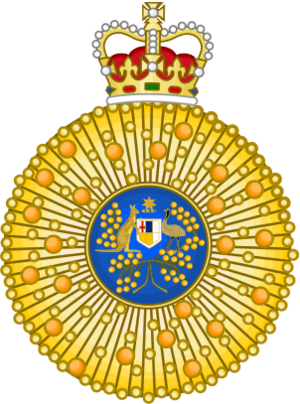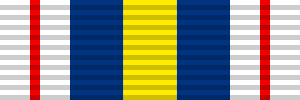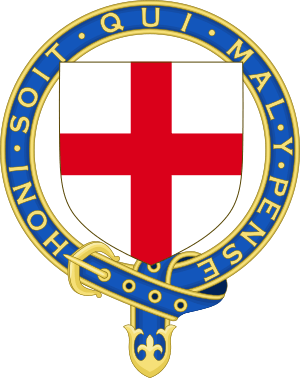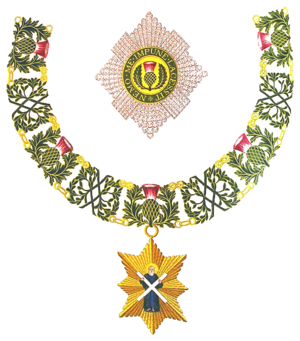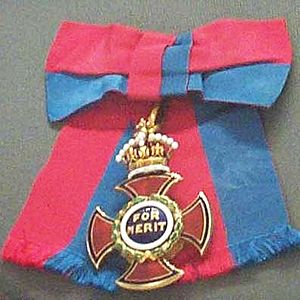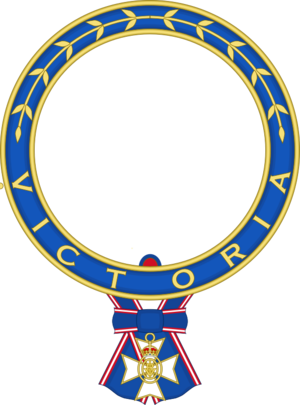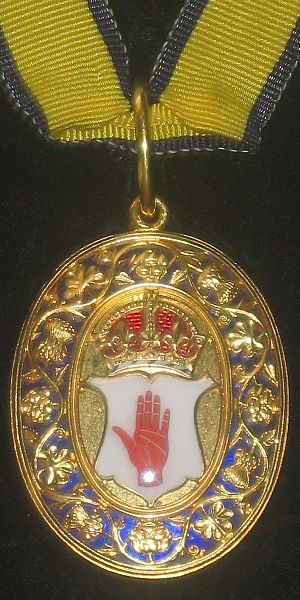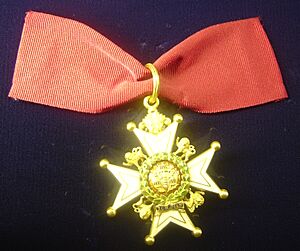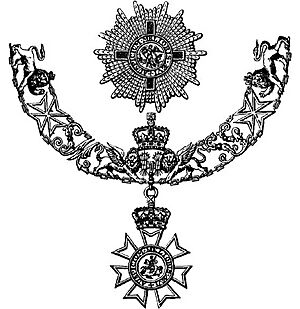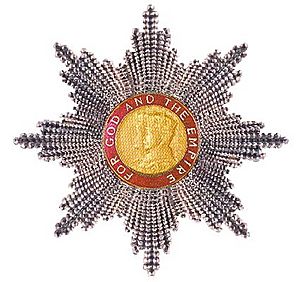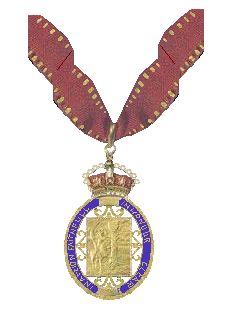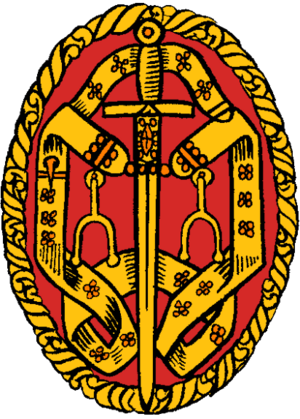Australian honours and awards system facts for kids
The Australian honours and awards system is a way for Australia to say "thank you" and "well done!" to people who have done amazing things for the country or for others. It includes special orders, decorations, and medals. These awards have been given out since 1975.
Before 1975, Australia mainly used the British honours system. This changed over time, and by 1994, Australia had its own system fully in place. However, the King of Australia can still give some British honours to Australians if he chooses to.
The Australian system includes "honours," which are like being invited into a special club (the Order of Australia), and "awards," which are medals. Awards can be for bravery, like the Cross of Valour, or for great service, like the Public Service Medal. There are also medals for serving in the military, for long service, and for special events.
The Order of Australia and the Australian Operational Service Medal are special because they have different ribbons for military and civilian people. Most awards are announced on Australia Day (January 26) and the King's Birthday holiday (June). Bravery awards and the Australian Antarctic Medal are announced at different times.
Contents
- History of Australian Honours
- How to Get an Award
- Types of Honours and Awards
- Australian Honours and Awards
- Royal Honours
- Imperial Honours
- Foreign Honours – including UN and NATO service
- See Also
History of Australian Honours
Australia used to use the British honours system. But in 1975, Australia started its own system. This meant fewer Australians were recommended for British awards. By 1983, the Australian government stopped recommending people for British awards. The last Australian states to recommend British awards were Queensland and Tasmania in 1989.
In 1992, it was decided that Australia would only give out its own honours. This means that any British awards given to Australians after October 5, 1992, are now seen as "foreign awards."
The Australian system is different from the British one because it allows awards to be given many years after an event. For example, some awards for actions in World War II or the Vietnam War have been given out much later. This is similar to how the United States does it.
The Australian honours system has sometimes faced criticism. Some people have said that the awards often go to people who already have a lot of status or power, rather than those who do selfless acts. For example, in 2021, there was a discussion when former tennis player Margaret Court received a high award, and some people returned their own awards in protest due to her controversial views.
How to Get an Award
There are two main ways people can receive an Australian honour or award:
- Nomination: Most awards, like the Order of Australia and bravery awards, come from nominations. Anyone can nominate someone from the public or a community group. Government departments also nominate people for service awards. People from other countries can also receive honorary awards if they have done something amazing for Australia or for humanity.
- Application: Some awards are given based on an application from the person or a recommendation made for them. This often happens for service awards for people in the defence force or police, or for special civilian services. Unlike some older bravery awards, people can even nominate themselves for an Australian Bravery Award.
Types of Honours and Awards
The Australian honours system has two main types:
- Honours: This is when someone is appointed to an "order of chivalry." The Order of Australia is the only one currently given in Australia.
- Awards: These are decorations or medals given to a person or group. Decorations are usually crosses or stars given for bravery, courage, or outstanding service. Medals are all other types of awards.
There are also different categories of awards:
Individual Honours and Awards
These are awards given to single people. They include:
- Awards from the Australian honours system.
- Awards given personally by the King.
- Awards from the Order of St John.
- British awards given before October 6, 1992.
- Foreign awards that the Governor-General has approved to be accepted and worn.
British awards given after October 5, 1992, are considered foreign awards.
Military Honours
The Australian Defence Force (ADF) has its own system to recognise great service by military units (not individuals) in combat. These are called battle honours, theatre honours, honour titles, and honour distinctions.
- Theatre Honour: This is for units that served in a large area where a military campaign took place, like Gallipoli 1915 or Vietnam 1965–1972.
- Battle Honour: This is for units that showed outstanding achievement in a specific battle or fight, like the Landing at Anzac Cove or the Kokoda Track.
- Honour Title: This is for non-combat units that still showed great achievement in a battle, like the 102nd Field Battery during the Battle of Coral–Balmoral.
- Honour Distinction: This is for units that performed well in operations that weren't full battles, like peacekeeping missions. An example is the 17th Construction Squadron in Namibia in 1989 and 1990.
Many units today can claim honours from older units that they are historically connected to.
Australian Honours and Awards
Order of Australia
The Order of Australia is Australia's main honour. Its symbols were designed in 1976 and use Australia's national colours, gold and royal blue. The design includes a wattle blossom and a crown, showing its link to the Australian Crown. Most of the pieces are made by the Royal Australian Mint.
The Order has two divisions: General (for civilians) and Military. The awards look the same, but the Military Division ribbon has a narrow gold band on each edge.
When it started, there were three levels: Member, Officer, and Companion. Later, the Knight and Dame levels were added, then removed, and then briefly brought back before being removed again in 2015. Now, there are four levels in both divisions. People cannot receive the award after they have died, but if they are nominated and pass away before the announcement, the award can be backdated.
The Council for the Order of Australia decides who should receive an award and at what level. This process can take a long time, sometimes up to 18 months.
Classes
Companion of the Order of Australia (AC)
This is for very high achievement and great service to Australia or humanity. No more than 35 Companions are appointed each year (not including honorary awards).
Officer of the Order of Australia (AO)
This is for distinguished service of a high level to Australia or humanity. No more than 140 Officers are appointed each year (not including honorary awards).
Member of the Order of Australia (AM)
This is for service in a specific area or to a particular group. No more than 340 Members are appointed each year (not including honorary awards).
Medal of the Order of Australia (OAM)
This medal is given for service that deserves special recognition. There is no limit to how many Medals of the Order can be awarded.
Recipients
| Order | Foundation | Motto | Chancellor | |
|---|---|---|---|---|
|
|
Order of Australia | 1975 – Elizabeth II | None | His Excellency General The Honourable David Hurley |
| Knights/Dames (AK/AD): Sir John Kerr (1976), Sir Robert Menzies (1976), Sir Colin Syme (1977), Sir Zelman Cowen (1977), Sir Macfarlane Burnet (1978), Dame Alexandra Hasluck (1978), Dame Enid Lyons (1980), Charles, Prince of Wales (as he then was) (1981), Sir Roden Cutler (1981), Sir Garfield Barwick (1981), Sir Charles Court (1982), Sir Ninian Stephen (1982), Sir Roy Wright (1983), Sir Gordon Jackson (1983), Dame Quentin Bryce (2014), Sir Peter Cosgrove (2014), Dame Marie Bashir (2014), Prince Philip, Duke of Edinburgh (2015), Sir Angus Houston (2015) | ||||
Gallantry Awards
These awards recognise acts of courage in combat or dangerous situations.
- Victoria Cross for Australia (VC)
- Star of Gallantry (SG)
- Medal for Gallantry (MG)
- Commendation for Gallantry
Bravery Awards
These awards recognise acts of bravery by civilians.
- Cross of Valour (CV)
- Star of Courage (SC)
- Bravery Medal (BM)
- Commendation for Brave Conduct
- Group Bravery Citation
Distinguished Service Awards
These awards recognise outstanding service in military operations.
- Distinguished Service Cross (DSC)
- Distinguished Service Medal (DSM)
- Commendation for Distinguished Service
Conspicuous Service Awards
These awards recognise highly unusual or outstanding service, often in non-combat roles.
- Conspicuous Service Cross (CSC)
- Conspicuous Service Medal (CSM)
Nursing Service Award
- Nursing Service Cross (NSC)
Meritorious Service Awards
These awards recognise excellent service in public roles.
- Public Service Medal (PSM)
- Australian Police Medal (APM)
- Australian Fire Service Medal (AFSM)
- Ambulance Service Medal (ASM)
- Emergency Services Medal (ESM)
- Australian Corrections Medal (ACM)
- Australian Intelligence Medal (AIM)
- Australian Antarctic Medal (AAM)
Campaign Medals
These medals are given for serving in specific military campaigns or operations.
- Australia Service Medal 1939–45
- Australian Active Service Medal 1945–1975
- Australian Service Medal 1945–1975
- Australian General Service Medal for Korea
- Vietnam Medal
- Vietnam Logistic and Support Medal
- Australian Active Service Medal
- Australian Service Medal
- Rhodesia Medal
- International Force East Timor Medal (INTERFET)
- Afghanistan Medal
- Iraq Medal
- Australian Operational Service Medal – Border Protection
- Australian Operational Service Medal – Civilian
- Australian Operational Service Medal – Greater Middle East Operation
- Australian Operational Service Medal – Special Operations
- Australian Operational Service Medal – Counter Terrorism/Special Recovery
- Australian Operational Service Medal – Africa
Special Service Medals
These medals are for specific types of service, often overseas or in emergencies.
- Police Overseas Service Medal
- Humanitarian Overseas Service Medal
- National Emergency Medal
- Civilian Service Medal 1939–1945
- National Police Service Medal
- Australian Sports Medal (2000, 2021–present)
Commemorative Medals
These medals are given to mark special anniversaries or events.
- 80th Anniversary Armistice Remembrance Medal
- Centenary Medal
Long Service Medals
These medals recognise long periods of service in various organisations.
- Defence Force Service Medal
- Reserve Force Decoration (RFD)
- Reserve Force Medal
- Defence Long Service Medal
- National Medal
- Australian Cadet Forces Service Medal
- Service Medal of the Order of St John
Other Defence Medals
- Australian Defence Medal
- Champion Shots Medal
- Anniversary of National Service 1951–1972 Medal
Royal Honours
The King can personally give some honours to Australians. These are still part of the British honours system and are managed by the UK.
| Order | Foundation | Motto | Officer(s) | ||
|---|---|---|---|---|---|
|
|
Most Noble Order of the Garter | 1348 – Edward III | Honi soit qui mal y pense "Shame upon him who thinks evil upon it" |
The Baroness Manningham-Buller (Chancellor) | |
| Knights/Ladies Companion (KG/LG): Richard Casey, Baron Casey (1969), Sir Paul Hasluck (1979), Sir Ninian Stephen (1994) | |||||
|
|
Most Ancient and Most Noble Order of the Thistle | 1687 – James VII of Scotland (James II of England) |
Nemo me impune lacessit "No one provokes me with impunity" |
The Duke of Buccleuch and Queensberry (Chancellor) | |
| Knights/Ladies (KT/LT): Sir Robert Menzies (1963) | |||||
|
|
Order of Merit | 1902 – Edward VII | "For Merit" | The Lord Janvrin (Registrar and Secretary) | |
| Members (OM): Samuel Alexander (1930), Gilbert Murray (1941), Sir Macfarlane Burnet (1958), Sir Owen Dixon (1963), Howard Florey, Baron Florey (1965), Sir Sidney Nolan (1983), Dame Joan Sutherland (1991), Robert May, Baron May of Oxford (2002), John Howard (2012) | |||||
|
|
Royal Victorian Order | 1896 – Victoria | "Victoria" | The Princess Royal (Grand Master) The Lord Parker of Minsmere (Chancellor) |
|
| Knights/Dames Grand Cross (GCVO): Sir Paul Hasluck (1970), Sir John Kerr (1977), Sir Zelman Cowen (1980), Sir Ninian Stephen (1982), Sir William Heseltine (1990) Knights/Dames Commander (KCVO/DCVO): Sir Brudenell White (1920), Sir Bertram Mackennal (1921), Sir George Pearce (1927), Sir Leighton Bracegirdle (1947), Sir Frank Berryman (1954), Sir Eric Harrison (1954), Sir John Lavarack (1954), Sir John Northcott (1954), Sir Percy Spender (1957), Sir Robert Jackson (1962), Sir Roy Dowling (1963), Sir Eric Woodward (1963), Sir Murray Tyrrell (1968), Sir Roden Cutler (1970), Sir Alan Mansfield (1970), Sir Reg Pollard (1970), Sir Stanley Burbury (1977), Sir Colin Hannah (1977), Sir Douglas Nicholls (1977), Sir James Scholtens (1977), Sir Wallace Kyle (1977), Sir Henry Winneke (1977), Sir John Yocklunn (1977), Sir Keith Seaman (1981), Sir James Ramsay (1981), Sir David Smith (1990) |
|||||
| Most Venerable Order of the Hospital of Saint John of Jerusalem | Royal charter 1888 – Victoria | Pro fide and Pro utilitate hominum "For the faith" and "For utility of men" |
The Duke of Gloucester (Grand Prior) Mark Compton (Lord Prior) |
||
| Bailiffs/Dames Grand Cross (GCStJ): Villis Raymond Marshall (1999), John David Spencer (2006), Neil Conn (2012), John Pearn (2014), Mark Compton (2017) | |||||
| Queen Elizabeth II Golden Jubilee Medal (2002) | Awarded by the Queen to living holders of the Victoria Cross (2) and George Cross (1) | ||||
| Awarded to: Edward Kenna, Keith Payne, Michael Pratt | |||||
| Queen Elizabeth II Diamond Jubilee Medal (2012) | Awarded by the Queen to living holders of the Victoria Cross (1), Victoria Cross for Australia (3), George Cross (1) and the Cross of Valour (5) | ||||
| Awarded to: Keith Payne, Mark Donaldson, Ben Roberts-Smith, Daniel Keighran, Michael Pratt, Darrell Tree, Victor Boscoe, Allan Sparkes, Timothy Britten, Richard Joyes | |||||
| Queen Elizabeth II Platinum Jubilee Medal (2022) | Awarded by the Queen to living holders of the Victoria Cross (1), Victoria Cross for Australia (3), George Cross (1) and the Cross of Valour (5) | ||||
| Awarded to: Keith Payne, Mark Donaldson, Ben Roberts-Smith, Daniel Keighran, Michael Pratt, Darrell Tree, Victor Boscoe, Allan Sparkes, Timothy Britten, Richard Joyes | |||||
| King Charles III Coronation Medal (2023) | Awarded by the King to living holders of the Victoria Cross (1), Victoria Cross for Australia (3), George Cross (1) and the Cross of Valour (5) | ||||
| Awarded to: Keith Payne, Mark Donaldson, Ben Roberts-Smith, Daniel Keighran, Michael Pratt, Darrell Tree, Victor Boscoe, Allan Sparkes, Timothy Britten, Richard Joyes | |||||
Imperial Honours
Before October 6, 1992, some British honours were part of the Australian system. Awards given before that date are still recognised in Australia. After that date, they are considered foreign awards.
| Order | Foundation | Motto | Officer(s) | ||
|---|---|---|---|---|---|
| Baronet/Baronetess | |||||
|
|||||
| Most Honourable Order of the Bath | 1725 – George I | Tria iuncta in uno Three joined in one |
The Prince of Wales (Great Master) Air Chief Marshal Sir Stephen Dalton (King of Arms) |
||
| Knights/Dames Grand Cross (GCB): Sir George Reid (1916), Sir Isaac Isaacs (1937), Sir Arthur Longmore (1941), Sir Edmund Hudleston (1963), Sir Wallace Kyle (1966), Sir John Hackett (1967), Sir William Heseltine (1990) Knights/Dames Commander (KCB/DCB): Sir William Bridges (1915), Sir Neville Howse (1917), Sir Harry Chauvel (1918), Sir Talbot Hobbs (1918), Sir John Monash (1918), Sir John Gellibrand (1919), Sir Thomas Glasgow (1919), Sir Charles Rosenthal (1919), Sir Brudenell White (1927), Sir George Hyde (1934), Sir Julius Bruche (1935), Sir Douglas Evill (1940), Sir Arthur Coningham (1941), Sir Thomas Blamey (1942), Sir Leslie Morshead (1942), Sir Peter Drummond (1943) |
|||||
| Most Distinguished Order of Saint Michael and Saint George | 1818 – George IV | Auspicium melioris ævi Token of a better age |
The Duke of Kent (Grand Master) The Lord Robertson of Port Ellen (Chancellor) |
||
| Knights/Dames Grand Cross (GCMG): Sir Henry Ayers (1894), Sir Frederick Darley (1901), Sir John Forrest (1901), Sir Edmund Barton (1902), Sir John Madden (1906), Sir George Reid (1911), Sir Joseph Cook (1918), Sir Harry Chauvel (1919), Sir John Monash (1919), Sir Isaac Isaacs (1932), Sir John Higgins (1934), Sir John Latham (1935), Sir William Irvine (1936), Sir Robert Garran (1937), Sir Earle Page (1938), Sir James Mitchell (1947), Sir William McKell (1951), Sir Owen Dixon (1954), Sir Thomas Playford (1957), Sir Arthur Fadden (1958), Sir Garfield Barwick (1965), Richard Casey, Baron Casey (1965), Sir Paul Hasluck (1969), Sir John McEwen (1971), Sir Henry Bolte (1978), Sir Robert Askin (1975), Sir John Kerr (1976), Sir Zelman Cowen (1977), Sir John Gorton (1977), Sir William McMahon (1977), Sir Harry Gibbs (1981), Sir Ninian Stephen (1982) | |||||
| Most Excellent Order of the British Empire | 1917 – George V | For God and the Empire | vacant (Grand Master) Lieutenant General Sir Robert Fulton (King of Arms) |
||
| Knights/Dames Grand Cross (GBE): Dame Flora Reid (1917), Sir Owen Cox (1920), Sir Thomas Robinson (1920), Dame Mary Hughes (1922), Dame Nellie Melba (1927), Sir Robert Gibson (1932), Sir Thomas Blamey (1943), Sir Douglas Evill (1946), Dame Pattie Menzies (1954), Dame Enid Lyons (1957) | |||||
| Order of the Companions of Honour | 1917 – George V | In action faithful and in honour clear | none | ||
| Members/Companions (CH): Joseph Lyons (1936), Billy Hughes (1941), Sir Earle Page (1942), Richard Casey, Baron Casey (1944), Sir Robert Menzies (1951), Harold Holt (1967), Sir John McEwen (1969), Sir John Gorton (1971), Sir William McMahon (1972), Malcolm Fraser (1977), Doug Anthony (1981) | |||||
| Knight Bachelor | Living Knights Bachelor: Sir Gustav Nossal (1977), Sir Roderick Carnegie (1978), Sir Andrew Grimwade (1980), Sir James Gobbo (1981), Sir James Hardy (1981), Sir William Kearney (1982), Sir Eric Neal (1982), Sir Frank Moore (1983), Sir Llewellyn Edwards (1984), Sir Graham McCamley (1986), Sir Leo Hielscher (1987), Sir Max Bingham (1988), Sir Peter Morris (1996), Sir Peter Barter (2001), Sir Rod Eddington (2005), Sir Marc Feldmann (2010), Sir Trevor Garland (2010), Sir David Higgins (2011), Sir Michael Hintze (2013), Sir Jonathan Mills (2013), Sir Chris Clarke (2015), Sir Lynton Crosby (2016), Sir Frank Lowy (2017) All other Knights Bachelor | ||||
Foreign Honours – including UN and NATO service
Australians can also receive honours from other countries, including for service with the United Nations (UN) or NATO. The Governor-General must give permission for these awards to be formally accepted and worn in Australia.
You can find lists of foreign awards commonly given to Australians on the Australian Honours Order of Wearing and Australian Campaign Medals pages.
See Also
- Australian Honours Order of Wearing
- Australian campaign medals
- List of Australian Victoria Cross recipients
- List of Australian George Cross recipients
- List of Australian Cross of Valour recipients
- List of Australian Star of Gallantry recipients
- List of Australian Star of Courage recipients
- List of Australian Medal for Gallantry recipients
- List of Australian Bravery Medal recipients
- List of Australian Distinguished Service Cross recipients
- List of Australian Distinguished Service Medal recipients
- List of Australian Conspicuous Service Cross recipients
- List of Australian Conspicuous Service Medal recipients
- List of Australian Nursing Service Cross recipients
- List of Australian Public Service Medal recipients
- List of Australian Police Medal recipients
- List of Australian Fire Service Medal recipients
- List of Australian Ambulance Service Medal recipients
- List of Australian Emergency Services Medal recipients
- List of Australian Corrections Medal recipients
- List of Australian Intelligence Medal recipients
- List of Australian Antarctic Medal recipients
- List of Australian Defence Force awards and decorations
- List of Australian military decorations
- List of Australian civilian decorations
- List of Australian commemorative medals
- List of Australian long service medals
- List of Australian special service medals
- List of Australian unit citations
- List of Australian Defence Force unit citations
- List of Australian bravery awards
- List of Australian distinguished service awards
- List of Australian conspicuous service awards
- List of Australian meritorious service awards
- List of Australian campaign medals
- List of Australian special service medals
- List of Australian commemorative medals
- List of Australian long service medals
- List of Australian Defence Force medals
- List of Australian Royal honours
- List of Australian Imperial honours
- List of Australian foreign honours
- List of Australian recipients of British honours
- List of Australian recipients of foreign honours
- List of Australian recipients of UN medals
- List of Australian recipients of NATO medals
- List of Australian recipients of other international awards
- List of Australian recipients of the Order of Australia
- List of Australian recipients of the Order of the British Empire
- List of Australian recipients of the Order of St Michael and St George
- List of Australian recipients of the Order of the Bath
- List of Australian recipients of the Royal Victorian Order
- List of Australian recipients of the Order of Merit
- List of Australian recipients of the Order of the Garter
- List of Australian recipients of the Order of the Thistle
- List of Australian recipients of the Order of the Companions of Honour
- List of Australian recipients of the Knight Bachelor
- List of Australian recipients of the Baronet
- List of Australian recipients of the Peerage
- List of Australian recipients of the Victoria Cross
- List of Australian recipients of the George Cross
- List of Australian recipients of the Cross of Valour
- List of Australian recipients of the Star of Gallantry
- List of Australian recipients of the Star of Courage
- List of Australian recipients of the Medal for Gallantry
- List of Australian recipients of the Bravery Medal
- List of Australian recipients of the Distinguished Service Cross
- List of Australian recipients of the Distinguished Service Medal
- List of Australian recipients of the Conspicuous Service Cross
- List of Australian recipients of the Conspicuous Service Medal
- List of Australian recipients of the Nursing Service Cross
- List of Australian recipients of the Public Service Medal
- List of Australian recipients of the Australian Police Medal
- List of Australian recipients of the Australian Fire Service Medal
- List of Australian recipients of the Ambulance Service Medal
- List of Australian recipients of the Emergency Services Medal
- List of Australian recipients of the Australian Corrections Medal
- List of Australian recipients of the Australian Intelligence Medal
- List of Australian recipients of the Australian Antarctic Medal
- List of Australian recipients of the Australia Service Medal 1939–45
- List of Australian recipients of the Australian Active Service Medal 1945–1975
- List of Australian recipients of the Australian Service Medal 1945–1975
- List of Australian recipients of the Australian General Service Medal for Korea
- List of Australian recipients of the Vietnam Medal
- List of Australian recipients of the Vietnam Logistic and Support Medal
- List of Australian recipients of the Australian Active Service Medal
- List of Australian recipients of the Australian Service Medal
- List of Australian recipients of the Rhodesia Medal
- List of Australian recipients of the International Force East Timor Medal
- List of Australian recipients of the Afghanistan Medal (Australia)
- List of Australian recipients of the Iraq Medal (Australia)
- List of Australian recipients of the Australian Operational Service Medal
- List of Australian recipients of the Police Overseas Service Medal (Australia)
- List of Australian recipients of the Humanitarian Overseas Service Medal
- List of Australian recipients of the National Emergency Medal (Australia)
- List of Australian recipients of the Civilian Service Medal 1939–1945
- List of Australian recipients of the National Police Service Medal
- List of Australian recipients of the Australian Sports Medal
- List of Australian recipients of the 80th Anniversary Armistice Remembrance Medal
- List of Australian recipients of the Centenary Medal
- List of Australian recipients of the Defence Force Service Medal
- List of Australian recipients of the Reserve Force Decoration
- List of Australian recipients of the Reserve Force Medal
- List of Australian recipients of the Defence Long Service Medal
- List of Australian recipients of the National Medal (Australia)
- List of Australian recipients of the Australian Cadet Forces Service Medal
- List of Australian recipients of the Service Medal of the Order of St John
- List of Australian recipients of the Australian Defence Medal
- List of Australian recipients of the Champion Shots Medal (Australia)
- List of Australian recipients of the Anniversary of National Service 1951–1972 Medal




